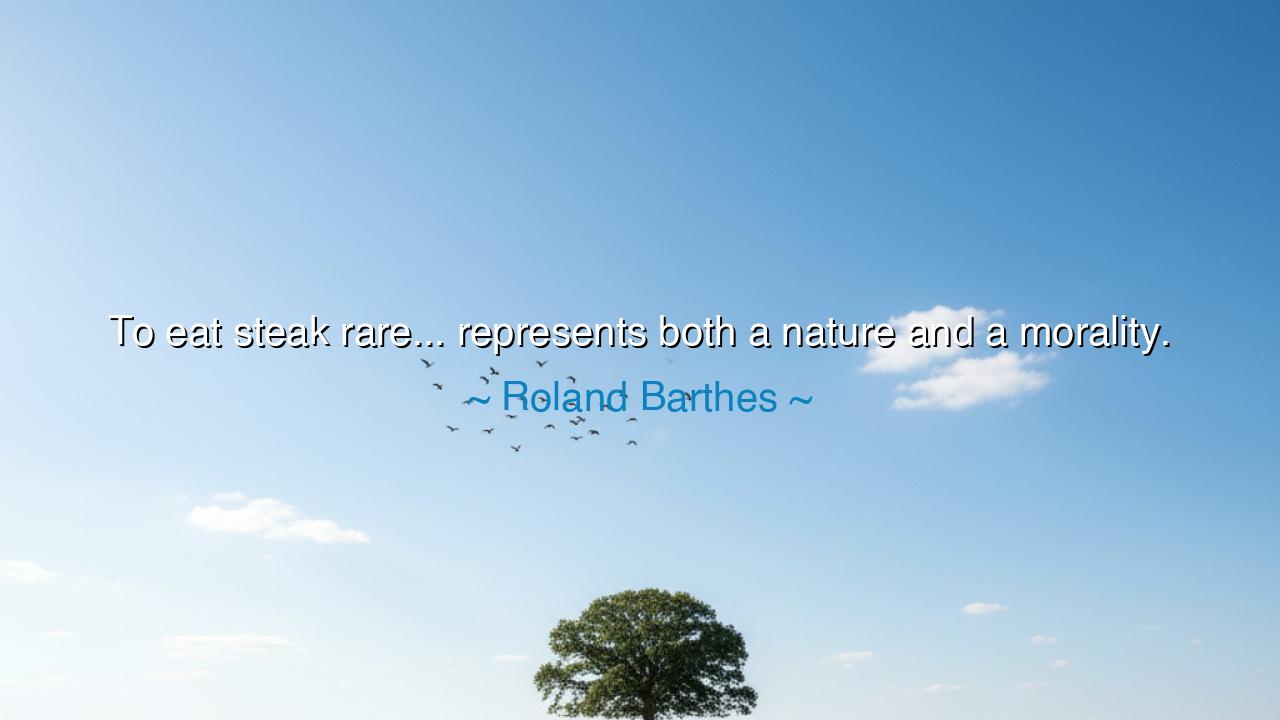
To eat steak rare... represents both a nature and a morality.






The words of Roland Barthes—“To eat steak rare... represents both a nature and a morality”—are not the idle musings of one who thinks only of food, but the piercing insight of one who understood symbols, culture, and the silent languages by which humanity expresses itself. He reminds us that even in something as ordinary as a meal, there lies a hidden philosophy. To eat steak rare, still close to its raw and primal state, is to embrace not only a taste but a vision of life: to affirm vitality, to touch the wildness of nature, to declare something about power, strength, and even virtue.
The origin of this reflection lies in Barthes’ meditations on cultural signs. As a philosopher of language and myth, he sought to show that human actions are never empty. Every gesture, every ritual carries meaning. In French culture, the rare steak was not just meat—it was a symbol of health, masculinity, and authenticity. It represented a closeness to nature, the red blood standing as proof of vitality. And beyond nature, it carried a morality, a statement of values: the eater aligns himself with vigor, honesty, and primal strength, scorning refinement that conceals the raw truth of life.
History gives us echoes of this symbolism. Among the ancient Greeks, the sacrificial ox or bull was offered to the gods, its flesh roasted and consumed as a sign of communion with divine and earthly power. In Rome, feasting on meat was a privilege of citizens and warriors, a sign of status and strength. Even in more recent times, explorers and soldiers ate their meat scarcely cooked in the wilderness, declaring through necessity and courage that they lived close to the earth, unshielded by luxury. Thus, Barthes’ observation is not confined to France, but belongs to a long tradition: food as a mirror of belief.
The emotional depth of Barthes’ words lies in their recognition of contradiction. For to eat rare steak is at once civilized and savage: civilized because it is prepared at the table, savage because it retains its blood. Here we see humanity’s eternal struggle between refinement and instinct, between culture and nature. The meal becomes a stage where these forces meet, and the choice of how one eats becomes a declaration of allegiance. Do you seek the raw and natural, or the cooked and tamed? Each path reflects not only preference, but identity.
There is also something heroic in this teaching. For Barthes suggests that food, often dismissed as mere necessity, can carry within it the drama of existence. To eat rare is not only to consume but to confront the essence of life itself—its blood, its mortality, its immediacy. It is to acknowledge that man is still bound to the earth, still an animal, yet an animal who knows symbols and can declare them through the simplest act. To recognize this is to see the sacred in the ordinary, and to live with awareness of meaning in all things.
The lesson for us is plain: nothing in life is neutral. Our choices, however small, reveal who we are and what we believe. Even at the table, we are telling a story about our relationship with nature, with strength, with morality. To live wisely is to be conscious of this, to act not as one sleepwalking through rituals, but as one awake to their symbolism. What we consume, how we consume, and why we consume are questions that speak to the essence of our values.
What, then, shall we do? Let us look with new eyes upon the daily acts of life—eating, walking, speaking, loving—and recognize that each contains both nature and morality. Let us ask: what are my actions declaring? Do they honor life, strength, and authenticity? Do they align with the values I wish to embody? And let us live in such a way that even the smallest gestures proclaim our truth.
Thus, Barthes’ words endure as a reminder that the ordinary is never merely ordinary. To eat steak rare is to affirm both a nature and a morality—to declare, in a single bite, where one stands in the great dance of instinct and culture. And so it is with all of life: our actions are signs, our choices are symbols, and through them we tell the story of who we are.






AAdministratorAdministrator
Welcome, honored guests. Please leave a comment, we will respond soon